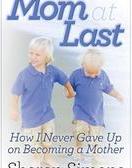It is an event in my life that I will never forget. I woke up one morning and after four weeks of nausea, fatigue and strange cravings, I felt “normal,” which seemed wrong. Everyone reassured me there was no reason to worry. I’d seen a strong heartbeat at a six-week ultrasound, I’d had no cramping or bleeding, and it is normal for pregnancy symptoms to fluctuate. But I just knew in my gut something was wrong.

Time seemed to stand still over the next two weeks while I waited for my scheduled 12-week ultrasound. Every moment of every day of that period my chest felt tight, and I was filled with anxiety and dread. The winks and nudges and innuendos I got from acquaintances on behalf of my already-bulging belly at a wedding only increased my misery.
The next day my husband and I arrived at the hospital for our first visit with an obstetrician. After several attempts using the doppler, the doctor admitted he could not find a heartbeat. I was now certain how this would end. He said an ultrasound would confirm the situation. I was forced to sit and wait for another few hours in a waiting room full of glowing women with massive pregnant bellies. I wept while my husband sat beside me, uncertain what to do or say.
All I remember next were the ultrasound tech’s words “I’m sorry.”
I was scheduled for a D&C the next morning since all of the “tissue” had been retained. After a sleepless night, I took the pills I had been instructed to take in order to make the procedure easier. Just over an hour later I was having severe cramping. By the time my husband dropped me at the door of the hospital so he could park the car, I was in so much pain I fell to my hands and knees. A stranger found a chair for me, but sitting offered no relief. My husband found me doubled over in the lobby, and he helped me up to the operating waiting room. By the time a nurse came to prep me, I had gone into shock and my blood pressure had dropped significantly. The nurse shook her head and said I should have been warned that the pills can have this effect. A shot of Demerol finally made the pain more bearable, and I sunk into a haze while they monitored my blood pressure.
I was put under for the procedure and when I awoke, my husband and mother were standing over me and a nurse handed me a cordless phone. The obstetrician told me everything had gone well and unless I had severe cramping or bleeding, I needn’t see him again until I was pregnant. No one asked me if I was okay. I wasn’t. No one asked me if I wanted support. I did.
This was a major turning point in my life. It didn’t make sense to me, and it did not seem right. It is one of the reasons I gave up my former career path, went back to school, and became an infertility counselor. It made me grow up. It made me realize the importance of family. The death of a child is widely recognized as one of the most difficult losses for an adult, and the age of the child has little impact on a parent’s grief.
Nevertheless, the psychological and emotional impact of miscarriage is generally overlooked in our society. I was appalled by a recent question sent to the Toronto Star’s Ethics Columnist regarding the ethics of having a funeral for a stillborn child. The person asked, “Ethically, isn’t there a problem with creating a ‘person’ out of this fetus, just to meet the emotional needs of grieving parents?”
Excuse me? People hold funerals for pets; what is wrong with having a funeral for an unborn child? Isn’t any funeral partly for the benefit of the grieving? Whether or not an unborn child is legally recognized as a person is, in my opinion, irrelevant.
Miscarriage and pregnancy loss, regardless of gestational age, increases the risk of general anxiety and of particular anxiety disorders such as obsessive-compulsive disorder and posttraumatic stress disorder for up to a year following the loss. Although at least 20 percent of all women experience a miscarriage, unlike with other forms of loss in our society, there are no established rituals to publicly acknowledge the event, structure mourning or gain social support. Research consistently finds that women who have experienced a miscarriage feel that the responses of friends and family minimize the significance of the event and are dissatisfied with the support they receive. In addition, health care professionals also fail to understand the implications and significance of pregnancy loss for women, and in spite of the risks of psychological morbidity do not routinely provide follow-up care to patients.
Image: FreeDigitalPhotos.net

